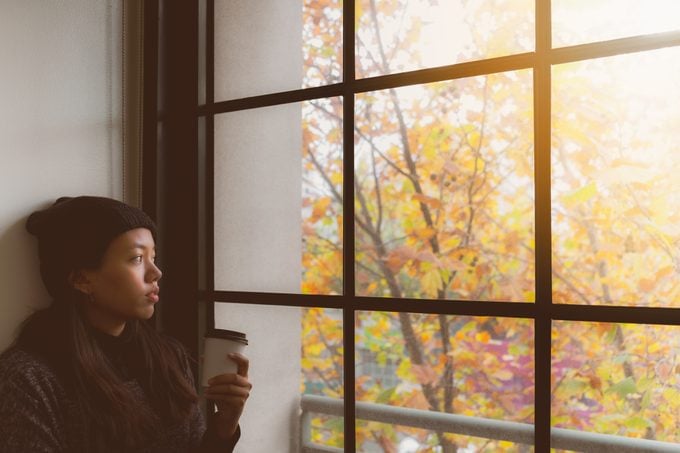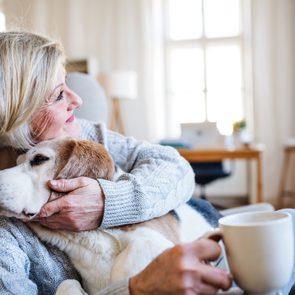Autumn Anxiety is Real: Why the Fall Season Makes You More Stressed
Updated: Dec. 04, 2020
The change in seasons, specifically from summer to fall, can evoke worry, fear, and other negative emotions.
Colorful leaves, cozy sweaters, a return to cooler weather, pumpkin spice everything: It’s no surprise that 40 percent of Americans say that fall is their favorite season, beating out second-place summer by a comfortable margin, according to a poll by international research and data analytics group, YouGov. Not everyone feels this way, however, and a significant amount of people actually do experience autumn anxiety, says Carrie Landin, a psychologist with UCHealth Integrative Medicine Center and a clinical instructor at the University of Colorado, department of psychiatry residency program. (Here’s how to have a healthier autumn.)
What is autumn anxiety?
Autumn anxiety is an increase in worry, fear, and other negative emotions related to the changing of the seasons. Just like there are many wonderful things to appreciate about the fall, there are also a lot of events that typically happen from September through December that can spur worry, particularly in people already prone to anxiety, Landin says. (Use these therapists’ tips to reduce anxiety.)
The two sources of autumn anxiety
This phenomenon is the result of physical changes that affect brain chemicals and environmental changes that affect daily life, says Kimberly Asner-Self, a licensed professional counselor, program director, and associate professor in clinical mental health counseling at Touro College’s School of Health Sciences in New York.

Physical changes
As the earth transitions from summer to fall, daylight decreases, triggering chemical changes in the brain in some people, Asner-Self says. “There is some evidence that in the Northern hemisphere during fall, as the Earth tilts away from the sun, our moods are affected. Less daylight leads to lower levels of serotonin, norepinephrine, and dopamine, the neurotransmitters that control our emotions,” she says. “As these neurotransmitters drop, the body responds by increasing levels of cortisol, the ‘stress hormone’ released in situations where we perceive threat. When there is more cortisol released than needed, then we can become anxious.”
These chemical changes lead to physical symptoms, including disturbances in sleeping patterns, symptoms of depression, and increased anxiety, she says.
Together, these chemical changes and physical symptoms are known as seasonal affective disorder (SAD). This term describes the serious decline in mood that can happen in the fall and winter months. Many people recognize SAD as a cause for depression, but they may not realize that it also encompasses anxiety symptoms, Asner-Self says.
Environmental changes
It’s not just the longer hours of darkness. Changes in your social or physical environment brought on by autumn can cause “anticipatory anxiety,” Landin says. “When we know there is the potential for stress ahead, we tend to anticipate the problems, feeling anxious before they even happen, Landin says. “It’s very common for people to feel this during autumn because they are anticipating the variety of stressors that come with colder weather and the end of the calendar year,” she says. This year will affect anticipatory anxiety about both the pandemic and politics as well as the holidays looking different.
It’s also possible to experience anticipatory anxiety in relation to positive things, like seeing family or upcoming holidays. “Fall is a wonderful time of year with many fun things happening so it can be confusing when we feel excited but also anxious and that confusion can lead to more anxiety,” Landin says.
Taming autumn anxiety
Dealing with autumn anxiety starts by identifying what your personal triggers are and making a plan to manage them before they start to feel overwhelming or out of control, says Mayra Mendez, a licensed psychotherapist, marriage and family therapist, and program coordinator of mental health services at Providence Saint John’s Hospital in Santa Monica, California. To help you figure out what’s causing your anxiety this fall, we asked our experts to share the most common triggers they see and how to manage them.
The beginning of a new school year
A new school year causes a lot of excitement but it also brings a lot of added responsibilities, particularly for parents, Mendez says. This is especially true in the middle of a pandemic. “Students and parents of students now have extra time commitments, expenses, and social stresses, all of which can be very anxiety-inducing,” she says.
How to deal: Decide right now what is necessary and what is just nice and then use your limited resources based on those priorities, Mendez says. For instance, your child may want to do three after-school clubs along with honors classes but realistically it may be better for all of you to limit extracurriculars, especially if you are worried about safety and face-to-face interaction right now. (Here’s how to get kids to a back to school sleep schedule.)
Losing the freedom of summer
Between vacations and school breaks, the whole vibe of summer is more relaxed. Leaving that behind to return to a stricter schedule in the fall can cause anxiety, Landin says.
How to deal: Schedule regular breaks and plan future vacations so you have things to look forward to, she says. Even if you’re just daydreaming, refocusing your mind on the positive will help reduce your anxiety.
Cold and flu season and coronavirus
Going into the season of coughs and sniffles is stressful most years but with the Covid-19 pandemic in full force, many people are experiencing an extreme amount of anxiety around getting sick this fall, Mendez says. If that’s you, you’re certainly not alone in your worries. To help you prepare, here’s a guide to cold and flu season.
How to deal: “Self-care is so important, both for your mental health and to boost your immune system,” she says. This includes getting adequate sleep, exercising, and eating a healthy diet—check out these delicious fall superfoods—but don’t forget to add in some things just for fun, like taking a long bubble bath or getting a fancy latte.
More hours of darkness
There’s nothing you can do about the Earth’s spot in its orbit around the sun but recognizing the lengthening darkness as a source of your increasing anxiety and acknowledging that it has a physiological cause can help you mentally, Asner-Self says.
How to deal: Make it a top priority to get sunlight on your face, first thing in the morning, every morning, she says. Taking a walk outdoors will get you light exposure, fresh air, and exercise but on days when that isn’t an option, sitting for 30 minutes in front of a light box can help. If that isn’t enough, talk to your doctor about medications available for treating SAD.
Election season and political events
This year’s election in November is already proving to be, like so many things in 2020, unprecedented and anxiety-provoking. Regardless of your political ideologies, there’s plenty happening to give everyone some sleepless nights, Mendez says. Some people, however, experience more than normal worry and find themselves sucked into a vortex of bad news, mistrust, and fear.
How to deal: “Turn off the news and social media. Reducing your media consumption can go a long way in reducing your anxiety,” she says. Sure this may mean that you miss some events but your mental health needs to be your first priority, she says. Set a firm limit, like only checking the news once per day, and stick to it.
Upcoming holidays
“Isolation, family problems, work demands, health issues, and money problems can all come together to make the holidays a very stressful time of year and yet the message is that we should all be filled with joy,” Landin says. The reality is that they can be both joyful and anxiety-provoking, at the same time.
How to deal: Plan ahead as much as possible by setting a budget and buying gifts early, scheduling holiday events, and setting menus, Mendez says. “After that, the best thing you can do is learn to say no and draw firm boundaries about what you can and cannot do during this season,” she says.
The year ending
Fall is the season of year-end performance reviews both at work and personally. As you review what you’ve accomplished and what goals you’ve failed to meet, you may experience a lot of anxiety. “A lot of people feel like they’ve failed as the end of the year suddenly feels close and they still have a lot of things undone,” Mendez says.
How to deal: The end of the year is a date on the calendar, nothing more. “There’s nothing that says you can’t keep working on your goals or set new goals at any point,” she says. “Setting an arbitrary deadline is unnecessary and adds stress.”
Party season
Fall is the season for office holiday parties, Thanksgiving dinners with extended family, going home for Christmas, Halloween parties, and many other seasonal get-togethers. As the weather gets colder, it’s natural to want to spend more time gathering indoors with loved ones but for introverts or people with social anxiety, this is their worst nightmare, Landin says.
How to deal: “It’s perfectly OK to say no,” Mendez says. “Pick a few gatherings that feel important or fun and then turn down any other invitations.” This is especially true this season as Covid-19 restrictions are still in force in many places, limiting the amount of people who can gather in one place.
No days off
The period between Labor Day (the first Monday in September) and Thanksgiving (the end of November) is one of the longest stretches of time without a recognized holiday that most Americans get off from work. This means nearly 11 weeks without a break and that allows anxiety to build up with no relief, Mendez says.
How to deal: Find reasons to celebrate—it can be anything from choosing a lesser-known holiday, like National Chocolate-Covered Pretzel Day (Oct. 7), to inventing your own, to throwing your dog a birthday party.
Stop anticipating problems
One of the best things you can do to reduce autumn anxiety is to stop anticipating problems. If you’re worried that the autumn will be awful then you will be looking for bad things. “You can only manage the moment, what’s happening right now, you can’t jump into the future and manage it,” Landin says. “I recommend practicing mindfulness as a way to keep your focus on the present. When you stay present-focused you are moving your attention away from your worries about what ‘could’ happen to what is actually happening right now.”
When anxious thoughts about the future start to creep in, and you start to anticipate bad things happening, bring your awareness to something that anchors you in the moment, like your breath and work to keep your focus there until you feel like it’s easier to let go of the worries, she says.























